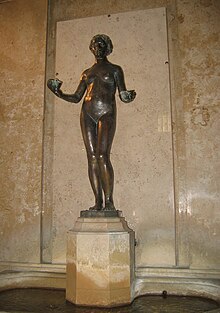Hermann Foery
Karl Hermann Föry (born August 7, 1879 in Bischweier , † October 2, 1930 in Bad Nauheim ) was a German sculptor and ceramist .
Life
Between 1892 and 1898 Föry completed an apprenticeship as a stone sculptor and then worked as a journeyman in Fidel Binz's workshop in Karlsruhe . In 1900 he began studying at the Karlsruhe Art Academy , which he completed in 1906. His professors there were Fridolin Dietsche , Hermann Volz and Ludwig Schmid-Reutte . From 1919 to 1921 Föry taught the modeling class at the Kunstgewerbeschule Pforzheim and then returned to Karlsruhe. From 1910 to 1925 he occasionally created building ceramics for the Grand Ducal Badische Majolika-Manufaktur Karlsruhe . For the Karlsruhe architect Hermann Billing designed Kiel City Hall he designed the ceramic interior, which is still partially preserved. The food rooms that Föry designed for the Wertheim department store in Berlin and for the Tietz department store in Cologne in collaboration with the majolica factory were destroyed in the Second World War.
Föry was buried in the main cemetery in Karlsruhe ; In 1956 his grave was declared an honorary grave . There is a bronze self-portrait from 1927 on the tombstone.
A street was named after him in the "Winkelfeld" development area in Bischweier.
Works
- 1911: Nymph (bronze fountain figure in Kiel town hall)
- 1914: War memorial in Eppingen
- 1919: bronze statuette by Hans Thoma (today in the Staatliche Kunsthalle Karlsruhe)
- 1927: Self-portrait (bronze figure, today in the Karlsruhe main cemetery)
- 1928: War memorial in Bortenberg
- 1928: Market woman on the old market in Karlsruhe
literature
- Fory, Hermann . In: General Artist Lexicon . The visual artists of all times and peoples (AKL). Volume 41, Saur, Munich a. a. 2004, ISBN 3-598-22781-7 , p. 474.
Web links
Individual evidence
- ^ Honors for H. Föry in the Karlsruher Stadt-Wiki
- ↑ Anett Beckmann: Mental history and aesthetic investigations of the sculptural tombs of the Karlsruhe main cemetery. Universitäts-Verlag Karlsruhe, Karlsruhe 2006, ISBN 978-3-86644-032-6 , p. 173.
| personal data | |
|---|---|
| SURNAME | Fory, Hermann |
| ALTERNATIVE NAMES | Föry, Karl Hermann (full name) |
| BRIEF DESCRIPTION | German sculptor and ceramist |
| DATE OF BIRTH | August 7, 1879 |
| PLACE OF BIRTH | Bischweier , Baden |
| DATE OF DEATH | October 2, 1930 |
| Place of death | Bad Nauheim , Hesse |
